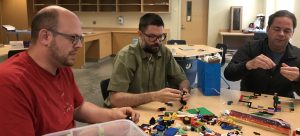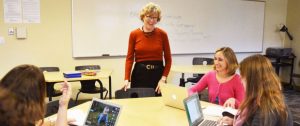Makerspace: Creating Spaces to Innovate
Makerspace is an upcoming movement in the field of education. The goal of makerspace is to design a place for kids and students to create, play, and innovate. Johanna Prince, Director of Graduate Programs at UMF, has been involved in helping to educate the public about makerspace and potentially design a makerspace on campus. Johanna oversees the Masters in Technology program at UMF and has an interest in educational technology.
Makerspaces can be implemented and used in various ways. “I have seen makerspaces in kindergarten classes, art classrooms, high schools using high end, high-tech equipment,” said Johanna, “there’s a wide range in who can make use of them.” Makerspaces can consist of a fixed location to work in, mobile spaces in which items are transported to different locations on a cart, or even just a few shelves in a classroom with tools and resources designated for student innovation and creativity. Common tools and materials used are craft supplies, glue guns, small power tools, laser cutters, circuitry equipment, and much more!
3D printers are becoming increasingly popular as well, as people from various fields of study make use of them to design and create various tools. 3D printers can be used to create small or large items, math manipulatives, three-dimensional maps to study geography and landforms, and some assistive technology tools as well, such as a device to help turn a door handle or turn on a light switch. There is a 3D printer on campus at UMF, but it is not easily accessible to the public. If you are interested in making use of the 3D printer for educational and professional purposes, please contact Johanna Prince at johanna.prince@mane.edu
While there is not yet a dedicated Makerspace location on campus, there are various resources in the area that students and faculty can make use of. Everyone’s Resource Depot (located in the Education Center basement) has an abundance of craft materials and miscellaneous supplies at a very affordable price. The 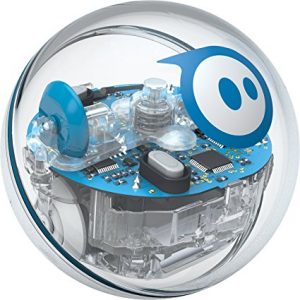 Spenciner Curriculum Materials Center (located on the first floor of the Education Center) has a variety of materials as well, including new Sphero Robots (pictured left), which can be controlled by tilting, tapping, or swiping your smartphone. Interested in learning more about Sphero Robots? Come to an interactive session using Sphero robotics and block based coding to play and learn, no prior knowledge or experience needed! This workshop will take place on Saturday, October 21st from 9:00-12:00 in Education Center 012. Spaces are limited to 20 participants, so fill out the registration form soon to ensure your spot!
Spenciner Curriculum Materials Center (located on the first floor of the Education Center) has a variety of materials as well, including new Sphero Robots (pictured left), which can be controlled by tilting, tapping, or swiping your smartphone. Interested in learning more about Sphero Robots? Come to an interactive session using Sphero robotics and block based coding to play and learn, no prior knowledge or experience needed! This workshop will take place on Saturday, October 21st from 9:00-12:00 in Education Center 012. Spaces are limited to 20 participants, so fill out the registration form soon to ensure your spot!
Are you interested in makerspace, and want to learn more about it what you can do with it? There will be two more makerspace workshops and discussions after the Sphero robotics coding one workshop:
Low Tech and High Tech Making: Saturday October 28th 9:00-12:00 in Education Center 012
Join us for a hands on session to explore high tech and low tech making. You’ll get a chance to play with 3D modeling software, use a 3D printer, and create using low-tech repurposed materials. Limited to 20 participants, so fill out the registration form before it’s too late!
What space is needed for a makerspace?: Wednesday December 6th 11:45-1:00 in Education Center 012
In this conversation we will continue to explore the ideal of making, creating and innovating. We’ll discuss the ways we already have these spaces in our community and places, as well as how we can leverage them to develop spaces and opportunities for more making.
At the last workshop, What is a makerspace?, there was an open conversation about makerspaces, what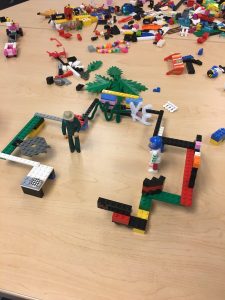 the goal of a makerspace is, and creativity! There was also a discussion about high school students who use high-tech materials in school coming to UMF, which has less tech integration and innovative technology faculty than their high school experience. It was an interesting and interactive discussion, and some small materials were provided to build and manipulate with. Check out these creations!
the goal of a makerspace is, and creativity! There was also a discussion about high school students who use high-tech materials in school coming to UMF, which has less tech integration and innovative technology faculty than their high school experience. It was an interesting and interactive discussion, and some small materials were provided to build and manipulate with. Check out these creations!
If you have any additional questions about makerspace, contact Johanna Prince (johanna.prince@maine.edu), Kathryn Will-Dubyak (kathryn.willdubyak@maine.edu), or Bryce Cundick (bryce.cundick@maine.edu). Stay up to date with the Ed360 blog to learn more about makerspace opportunities!
National Bullying Prevention Month
Did you know that October is National Bullying Prevention Month? National Bullying Prevention Month is a nationwide campaign founded in 2006 by PACER’s National Bullying Prevention Center. Educators and communities across the nation raise awareness about bullying and promote bullying prevention.
The Maine Education for Association reported these facts and finding about bullying in their newsletter:
- Bullying occurs once every seven minutes in schools across America. In fact, one in every three students reports being bullied weekly, in person, via email, or through social media.
- When NEA surveyed members a few years ago, nearly 100 percent of respondents said it was their job to intervene when they saw bullying occur.
- Research by GLSEN (the Gay, Lesbian and Straight Education Network) shows that vulnerable students, who often are targeted for bullying because of their race, ethnicity, or LGBTQ status, can generally name at least one supportive adult in their schools, but it takes six or more supportive adults to make a difference when it comes to bullying.
- GLSEN’s Ally Week, September 25-29, is a student-driven program in which students and educators who are LGBTQ lead conversations about what kind of support, understanding, and encouragement they need from their allies.
So, what can you do to stop bullying and promote acceptance in your classroom? PACER’s NBPC provides these and other various ways to get involved in promoting bullying prevention:
- Join the cause- Historically, bullying has been viewed as “a rite of passage,” but National Bullying Prevention Month is now a nationwide call to action — providing schools, parents and students with the educational resources and support to better respond to bullying
 behavior.
behavior. - Provide resources and reminders to students- PACER offers various resources for students and teachers, including FREE “Kids Against Bullying” bookmarks that can be printed or ordered (plus shipping and handling). A daily reminder of the cause will help children remember the importance of preventing bullying.
- Make it a known campaign- Tell everyone that your school and community are participating in National Bullying Prevention Month by alerting news media, sharing on social media, campaigning around town, etc. Get the word out there!
- Let victims know that they are not alone- Make it a priority to promote empathy and compassion for those being bullied. Encourage them to talk about it, address it, and let children know that there are people who are there for them no matter what. Children always need a hero.
- Create a communal art project- Allow students to be artistic and work together on a banner, poster, sculpture, video, or anything else that relays the anti-bullying message. Allowing kids to work together on one project will form a sense of community and belonging within all children, as well as allow them to have their ideas and voices be put into the initiative.
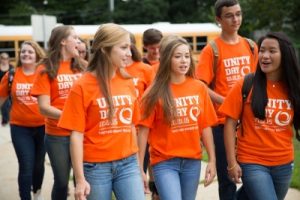
- Wear orange- NBPC has dedicated orange as the color of National Bullying Prevention Month, and PACER will soon be coming out with a line of t-shirts and other orange items promoting the cause.
By working together as a community and nation, we can end bullying among children and teens and promote a more accepting and welcoming environment for all. While teaching and/or interacting with students and children, especially during the month of October, remember the importance of promoting a bully-free environment and incorporate these tools and lessons with everyday experiences. For more resources and to learn more about PACER’s National Bullying Prevention Center, visit their website.
Meet the New Faculty of Special Education
The Special Education department at UMF is proud to welcome some new, bright, exciting members to the professional team. Kate MacLeod, Dominique Tetzlaff, and Kevin Good are the newest professors in special education at UMF.
Kate MacLeod is joining the the special education faculty in the Secondary and Special Education Division here at UMF. She is completing her doctorate in Special Education at Syracuse University and holds a Certificate of Advanced Study in Disability Studies from Syracuse and a Masters of Science in Special Education from Long Island University. Kate was a high school special education teacher and inclusion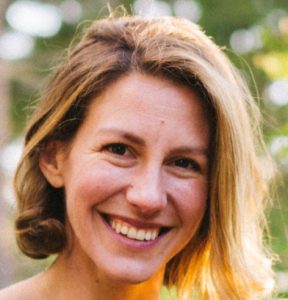 facilitator in New York City, and has expertise working with urban adolescents with disabilities. Her research and writing has been published in academic journals such as Educational Leadership, Disability & Society, Education and Training in Autism and Developmental Disabilities, and International Journal of Whole Schooling, educational magazines such as Rethinking Schools and TASH Connections, and book anthologies focused on inclusive and special education. Her current research agenda is focused on best practices for the inclusion of students with complex support needs; understanding the culture of inclusive schools; and the development of teacher networks to support inclusive education. Kate is also an educational consultant who works with administrators, teachers, and families in the northeast and across the country to support their work to create and improve inclusive practice and culture for all students. She is a new resident of Unity, Maine and when she is not teaching, researching, or working with schools and families, she loves to play music with her husband and friends, and spend time outside with her dog Amelia. Kate is absolutely thrilled to join the UMF community!
facilitator in New York City, and has expertise working with urban adolescents with disabilities. Her research and writing has been published in academic journals such as Educational Leadership, Disability & Society, Education and Training in Autism and Developmental Disabilities, and International Journal of Whole Schooling, educational magazines such as Rethinking Schools and TASH Connections, and book anthologies focused on inclusive and special education. Her current research agenda is focused on best practices for the inclusion of students with complex support needs; understanding the culture of inclusive schools; and the development of teacher networks to support inclusive education. Kate is also an educational consultant who works with administrators, teachers, and families in the northeast and across the country to support their work to create and improve inclusive practice and culture for all students. She is a new resident of Unity, Maine and when she is not teaching, researching, or working with schools and families, she loves to play music with her husband and friends, and spend time outside with her dog Amelia. Kate is absolutely thrilled to join the UMF community!
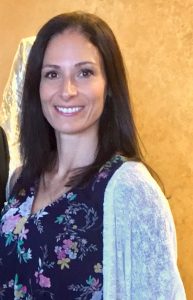 Dominique Tetzlaff has been in the field of education for almost ten years. She started her career as a special education teacher in a middle school serving at-risk students in a high poverty community. Dominique recently completed her doctorate in Special Education at the University of Nevada, Las Vegas, and she specializes in high incidence disabilities, using technology for students with disabilities, and methods for teaching English Language Learners. Her dissertation study Using Mobile Technology to Increase the Math Achievement and Engagement of Students with Disabilities focused on the critical design features and implementation of mobile devices to support teacher-directed instruction. Dominique hopes to further expand this research line to develop guidelines for using digital lessons in the core content areas for students with disabilities. Dominique is very excited to be part of the UMF faculty and is looking forward to enjoying the community with her family!
Dominique Tetzlaff has been in the field of education for almost ten years. She started her career as a special education teacher in a middle school serving at-risk students in a high poverty community. Dominique recently completed her doctorate in Special Education at the University of Nevada, Las Vegas, and she specializes in high incidence disabilities, using technology for students with disabilities, and methods for teaching English Language Learners. Her dissertation study Using Mobile Technology to Increase the Math Achievement and Engagement of Students with Disabilities focused on the critical design features and implementation of mobile devices to support teacher-directed instruction. Dominique hopes to further expand this research line to develop guidelines for using digital lessons in the core content areas for students with disabilities. Dominique is very excited to be part of the UMF faculty and is looking forward to enjoying the community with her family!
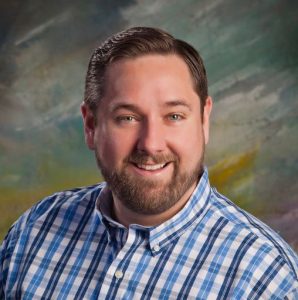
Kevin Good is an instructor in Special Education. He holds two master’s degrees and is preparing to finish his Ph.D. His focus in special education has resulted in various experiences including teaching, research, advocacy, and assistive technology consulting. Kevin is interested in all areas of special education, but his primary teaching and research is on assistive technology, inclusive education, teacher education, literacy, academic and behavioral instructional approaches, and best practices in instruction and technology use. His primary goal is to develop and mentor future teachers as they prepare to meet the needs of all learners. He is also excited to work with community members with their assistive technology needs be it related to pk-12 education, higher education, or life. As the Maine CITE coordinator at UMF, Kevin seeks to help all individuals at UMF learn more about the roles of assistive technology in the classroom and in life. Kevin is excited to be joining the UMF community because of its longstanding reputation in teacher education and its location in one of the most beautiful places in the country!
UMF is very excited to welcome Kate, Dominique, and Kevin to our faculty. If you see them around campus be sure to say hello and welcome them to Farmington. From all of here at UMF, we want to give a warm welcome to our new professors in Special Education!
Praxis Core Review Sessions Fall 2017
The UMF Learning Commons hosts multiple Praxis Core review sessions for students who would like some extra assistance preparing for the test. These sessions will be held as followed:
| Writing- Multiple Choice | Monday, September 18th | 7-8 PM | Ed Center 107 |
| Math- Functions & Algebra | Wednesday, September 20th | 7-8PM | Ed Center 106 |
| Writing- Informative Essay | Monday, September 25th | 7-8 PM | Ed Center 107 |
| Math- Geometry | Wednesday, September 27th | 7-8 PM | Ed Center 106 |
| Writing- Argumentative Essay | Monday, October 2nd | 7-8 PM | Ed Center 107 |
| Math- Stats & Probability | Wednesday, October 4th | 7-8 PM | Ed Center 106 |
Students are also welcome to visit the Learning Commons during tutoring hours (M-Th 12-2, Su-Th 7-9) for individual help.
An excellent online resource is the Learning Express Library. Once you create a free account, you can search for ‘PRAXIS Core’ to call up 4 different practice PRAXIS tests in Writing and Math.
Live and Work in Maine
Maine is facing a demographic dilemma- the population is growing older, and workers are retiring at rates higher than new employees are entering the field. Maine needs to develop a strong workforce to help ensure that employers can continue to thrive. Live and Work in Maine is an initiative to recruit hard working individuals from across the country and the world to live in the beautiful state of Maine.
With Live and Work in Maine, you can search for places to live or places to work, and the other will follow.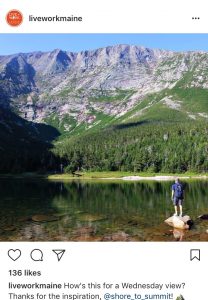 If you care more about living in the mountains than anything else, they can help you find the perfect location and then a job to follow. If you are willing to live on the beach, in the woods, or in the city- wherever it takes to get you your dream job- then Live and Work in Maine can help you find that job and then a place to live from there. “Our mission is to show the world that in Maine, you can have it all when it comes to quality of life AND quality of career.”
If you care more about living in the mountains than anything else, they can help you find the perfect location and then a job to follow. If you are willing to live on the beach, in the woods, or in the city- wherever it takes to get you your dream job- then Live and Work in Maine can help you find that job and then a place to live from there. “Our mission is to show the world that in Maine, you can have it all when it comes to quality of life AND quality of career.”
So, how do you go about finding the perfect place to live? You can search for a location based on three different categories:
Region– the various regions of Maine that are listed include: Aroostook County, Downeast & Acadia, Maine Lakes & Mountains, Kennebec Valley, Maine Highlands, Midcoast, Greater Portland & Casco Bay, and Maine Beaches
Lifestyle– if there are certain hobbies, sceneries, structures, or population density that you prefer, you can 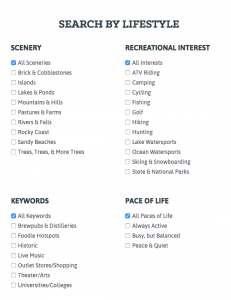 filter for them! Various lifestyle choices listed include (but are not limited to): lakes & ponds, bricks and cobblestone, “trees, trees, & more trees”, camping, fishing, golf, hunting, ski/snow sports, historic, live music, shopping, theatre/arts, always active, peace & quiet, etc. It is easy to find something for everyone!
filter for them! Various lifestyle choices listed include (but are not limited to): lakes & ponds, bricks and cobblestone, “trees, trees, & more trees”, camping, fishing, golf, hunting, ski/snow sports, historic, live music, shopping, theatre/arts, always active, peace & quiet, etc. It is easy to find something for everyone!
Career– You can also search for regions/areas that have available jobs that meet specific filters, such as job industry, region, employer size, internships, seasonal jobs, and entry level jobs.
How do you go about finding your dream job in Maine? Jobs and internships can also be searched for and explored in a couple of ways:
Job Board– on the Job Board page you can search for jobs by keyword, job title or specific location. Jobs can be filtered by type, geographic region, and industry. The Job Board also lists job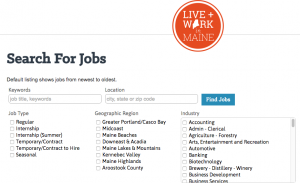 postings with job title, employer name and location, description of job, and links to apply, view the employer profile, and save the job posting. See a job that your friend would be perfect for? There is also an option to share the job info with a friend! What better way to find your dream job and move to Vacationland than to do it with a friend?
postings with job title, employer name and location, description of job, and links to apply, view the employer profile, and save the job posting. See a job that your friend would be perfect for? There is also an option to share the job info with a friend! What better way to find your dream job and move to Vacationland than to do it with a friend?
Explore Employers– The Explore Employers page allows for you to search for employers based on employer name, career, and lifestyle. Each employer profile includes brief description, location information, and contact info to get in touch with the employer.
 Live and Work in Maine strives to help individuals relocate to an area they will love, and work in a position that will allow them to thrive. The Live and Work in Maine Instagram page (@liveworkmaine) includes an abundance of pictures exhibiting the various lifestyles and hobbies that can be lived in Maine.
Live and Work in Maine strives to help individuals relocate to an area they will love, and work in a position that will allow them to thrive. The Live and Work in Maine Instagram page (@liveworkmaine) includes an abundance of pictures exhibiting the various lifestyles and hobbies that can be lived in Maine.
Foodies, hikers, adventurers, writers, artists, entrepreneurs, and everyone else is sure to find somewhere and something they love in Maine. Find what you love, and find it in Maine.
Tips for Staying Organized This Semester
Syllabus week: the week where you get to see just how challenging and time consuming each class will be, as well as the expectations placed upon you this semester. It is easy to fall behind and get overwhelmed, especially within the few weeks of the semester. To make sure you keep up with the readings, hand in assignments on time, and have a happy and successful semester, follow these tips to stay organized!:
1.Get a planner… and use it!
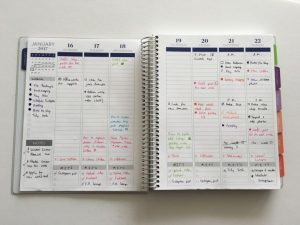
Often times, students will pick out the best planner they can find, get so excited about using it, and end up forgetting about it after the second week. Get into the habit of writing EVERYTHING in it-assignments, meetings, work schedule, assigned readings, plans with friends, etc. If you get into the habit of using your planner every day, you will be more likely to use it all the time.
2. Highlight your syllabus
Sometimes, syllabi can be overwhelming to look it. Every professor sets theirs up differently, and it can be hard to find and differentiate actual assignment due dates from quizzes and readings. If you assign a different color to different kinds of assignments (readings, tests/quizzes, assignments to hand in, etc.) then you can quickly glance at your syllabus and see if there is anything coming up without having to stare at an overwhelming syllabus for too long.
3. Schedule homework/study time
Where as you are already following a class schedule, adding a few blocks of time across the week dedicated 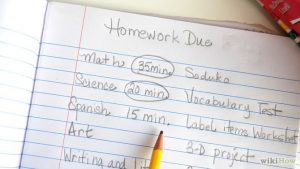 to studying and homework can help ensure that you get your assignments done. The schedule can be catered to your needs- if you prefer to work for a long period of time, then setting aside a few hours every couple of days to bang out all of your homework will work; if you can’t focus on one thing for very long, giving yourself an hour in the morning and an hour or two in the afternoon every day might be best. Or, maybe you prefer to save it all for Sunday. You should make a homework schedule that caters to your needs and will help you be most successful.
to studying and homework can help ensure that you get your assignments done. The schedule can be catered to your needs- if you prefer to work for a long period of time, then setting aside a few hours every couple of days to bang out all of your homework will work; if you can’t focus on one thing for very long, giving yourself an hour in the morning and an hour or two in the afternoon every day might be best. Or, maybe you prefer to save it all for Sunday. You should make a homework schedule that caters to your needs and will help you be most successful.
4. Make a morning routine that you enjoy, and do it every day
It can be very hard to feel motivated in the morning, especially when you have early classes. If you create a morning routine that you enjoy, you will be more motivated to get out of bed. Love having a nice hot cup of coffee in the morning? Set the coffee maker up the night before so that all you have to do is turn it on and start it, and there’s your coffee! Do you enjoy getting your body moving in the morning? Wake up an extra half hour early to go for a light jog or a walk, or do some yoga right in your room! Create a morning playlist that you listen to as you get ready to pump you up in the morning. Find what it is that you enjoy doing in the morning and incorporate it into your routine in order to motivate yourself each morning!
5. Plan the night before
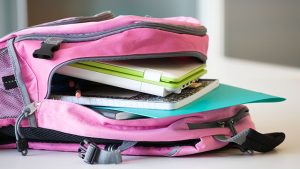
Picking out your outfit and packing your backpack can take up an extra 10-15 minutes in the morning. Pick and set your outfit out the night before, and pack your backpack the night before. It will save you time before you leave, and you can also make sure you have everything you need. You don’t want to forget a few things or bring the wrong book with you if you pack your bag when you’re half awake in the morning.
6. Print things out ahead of time, every time
As great as technology is, it can fail as well. There is nothing worse than not being able to print your paper ten minutes before class starts. And chances are, most professors will not consider technology failure as an excuse for late assignments. Print assignments out the day before they are due, or even a few hours before they are due. If something goes wrong, there will be plenty of time to fix it or print in another location. Printing locations on campus include: Spenciner Curriculum Materials Center (located in the Education Center), the Learning Commons (Mantor Library first floor), Mantor Library 3rd floor, and the Technology Commons (open 24/7).
7. Make use of various study locations on campus
UMF is a beautiful campus, with many locations to work on homework and assignments. Some locations, that may be busy and noisy sometimes, include the lobby in the Kalikow Education Center, Beaver Lodge, The Landing, the Technology Center, and the lounge/common room in the dorms. Mantor Library has many options, including private study rooms (in the basement and on the second floor), the mezzanine, the Learning Commons (first floor), Mantor Cafe, and the third floor which is often the quietest. The Learning Commons, private study rooms, and Technology Center have spaces that are designed for group work as well. Explore the campus and try various spots until you find the one that works best for you.
8. Manage your time wisely when it comes to assignments
It is important to learn how to plan out your tasks in order of importance/time consumption. If you have a 10 page paper due on Thursday, do not start it on Tuesday. Start it at least a week in advance, if not sooner. This can give you an opportunity to do multiple drafts, take breaks from your writing, and give it 100% every time you work on it, as opposed to your effort dwindling down during the second half of the assignment. If you have a bigger assignment due on Friday than what is due on Thursday, you should start the big one first. Know what is a priority and what can wait, what needs more time and attention and what can be done within a few minutes. This will really help you stay organized and on top of assignments.
9. Schedule the non-academic tasks/chores that you are responsible for completing
After being in class and working all day, no one wants to do laundry, sweep, dust, vacuum, do dishes, etc. Create a simple, one task a day schedule. Assign yourself laundry on Monday, vacuuming on Tuesday, dusting on Wednesday, sweeping Thursday, and general picking up on Friday. If you give yourself one task a day, it will be easier to get it over with and ensure that your environment is taken care of. Living in a cluttered, messy space can make it hard to keep other areas of your life organized as well.
10. Make time for yourself
 Self care is so important when you are a busy college student. Classes, assignments, sports, meetings, work- it can all add up quickly and burn you out. Make sure you take time each day and week to do something for yourself. It can be anything that you enjoy, as long as you are doing it because you want to, not because you have to. You can read, go for a walk, take a nap, hangout with friends and family, paint, go to the gym, shop, watch your favorite movie- it does not matter, as long as you set aside time where you are not working on or thinking about your other responsibilities.
Self care is so important when you are a busy college student. Classes, assignments, sports, meetings, work- it can all add up quickly and burn you out. Make sure you take time each day and week to do something for yourself. It can be anything that you enjoy, as long as you are doing it because you want to, not because you have to. You can read, go for a walk, take a nap, hangout with friends and family, paint, go to the gym, shop, watch your favorite movie- it does not matter, as long as you set aside time where you are not working on or thinking about your other responsibilities.
Student Teaching Symposium #CountOnLearning
The final semester of college for most education majors is one of the most anticipated as they finally take on the role as a student teacher. Students are nervous, excited, anxious, and optimistic as they go into their student teaching position. Most students do not know what to expect during student teaching or how to prepare. Chelsey Oliver, UMF Class of 2017, felt the same way, as she would go to the symposium presentations every year looking for one about the student teaching experience. Year after year her searches came up short, so when it was her time to serve as a student teacher she decided to present at symposium about her experience.
Chelsey Oliver just graduated from the University of Maine at Farmington in the spring of 2017. During her final semester as a secondary education mathematics major, Chelsey completed her student teaching at Cony High School and Messalonskee Middle School. While education majors share their student teaching experience through portfolio presentations, Chelsey wanted to go beyond the units, lesson plans, and standards highlighted in portfolio presentations and also focus on the day-to-day experience of being a student 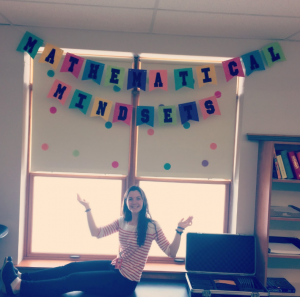 teacher in a classroom. “A big part of my philosophy is collaborating with your colleagues, students, and teachers,” said Chelsey, “so this to me was the most exciting presentation I would give.”
teacher in a classroom. “A big part of my philosophy is collaborating with your colleagues, students, and teachers,” said Chelsey, “so this to me was the most exciting presentation I would give.”
Chelsey started her presentation by going over the daily schedule at both schools and comparing them. She touched upon some of the ‘out of the classroom’ components that came with student teaching, such as leaving the house in the morning when it is still dark out and getting home when it was dark out. Chelsey described some of the various programs and blocks in the school day, such as “RAM Time” at Cony High School, which was when teachers could meet one-on-one with students who may need help if they were absent, falling behind, or needed to finish a test. This was a great time for teachers to check-in with their students.
After going over the schedules, Chelsey emphasized the importance of self care and scheduling “me time.” As a teacher, you are constantly planning, grading, teaching, and working even when you are not at school. It is important to take care of yourself, and Chelsey did so by getting fresh air, meal prepping for the week ahead of time, and reflecting on her day.
Chelsey then gave a few classroom management tips, such as having a bin to leave work in for students who were absent. She also discussed making homework meaningful. She found that her students would do their homework, she would give feedback, and they would toss it in the trash. Chelsey then began assigning homework that required the students to talk about their struggles, their mistakes, a conversation they had with her that day, and to just personally reflect. This gave Chelsey a more personal look into her students’ lives as well. Chelsey then discussed technology and how it can be integrated into the classroom. Then, Chelsey touched upon her experience in UMF’s Student MEA (Maine Education Association) and how the various conferences, experiences, and collaborations that she participated in helped her develop as a professional.
Finally, Chelsey discussed the benefits of social media and how teachers can learn from each other. There 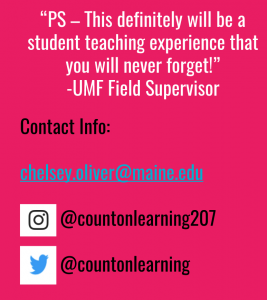 are various Instagram pages, bloggers, and websites where teachers share their lessons, ideas, classroom management tips, and anything else you could imagine. Chelsey has also taken to social media and created a professional Twitter account (@countonlearning) and Instagram page (@countonlearning207) to share her teaching experience.
are various Instagram pages, bloggers, and websites where teachers share their lessons, ideas, classroom management tips, and anything else you could imagine. Chelsey has also taken to social media and created a professional Twitter account (@countonlearning) and Instagram page (@countonlearning207) to share her teaching experience.
Chelsey’s student teaching experience was very meaningful to her, especially since she was able to personally share it at her symposium presentation. As the first student to present about their student teaching experience at symposium, she may have started a new trend as other UMF education majors will wish to share their experience as well. Congratulations to Chelsey and the rest of the UMF Class of 2017, and good luck as your begin your teaching career!
Recent Grads off to Paris!
Graduating from college is a very exciting time, but can also be stressful for many as they try to find a great job within their chosen field. However, two recent UMF graduates have found themselves with teaching positions at France universities! Hannah Somes and Hannah Carlson will be moving to France later this month to begin this new journey.
Both Hannah Somes and Hannah Carlson will be leading conversation-oriented English courses at the university level in order to help students become more fluent in English. They both learned about this opportunity through the French professors at UMF.
Hannah Somes will be living in Angers and will be residing in a dorm room in the campus residences. When asked what she is most looking forward to, Hannah said that she is hoping to gain an increased sense of confidence in herself as well as self-sufficiency. Hannah is also looking forward to being on the “other side” of the university experience as a faculty member this time. When asked what she is nervous about, she said “I am most nervous about leading my own class of university students who have a different first language from my own,” which is something that anyone would be nervous about! This is also the furthest from her family and friends she will have ever been, so that will be an adjustment as well.
Hannah Carlson will be living in an apartment in Les Mans, a city that is just about an hour train ride from Paris! Hannah is looking forward to becoming  more proficient in French and to teaching English to the students in Les Mans. Hannah studied abroad for the spring 2016 semester in Les Mans (pictured right), so she is already familiar with the area. Hannah said she is also looking forward to traveling and seeing more of France and Europe.
more proficient in French and to teaching English to the students in Les Mans. Hannah studied abroad for the spring 2016 semester in Les Mans (pictured right), so she is already familiar with the area. Hannah said she is also looking forward to traveling and seeing more of France and Europe.
What an amazing opportunity for these UMF alumna! We are very excited for the both of them and cannot wait to hear more about their adventures. Be sure to stay up to date with the ED360 blog to learn about more opportunities like this, as well as to hear from the Hannah’s again and learn about how their experience is going! From all of us at the University of Maine at Farmington, good luck and safe travels to the Hannah’s!
Meet the Editor: Brittany Jerome
Staff retirements, students teaching abroad, tips for applying to grad school- have you ever wondered who writes the blog posts for ED360? Brittany Jerome, an upcoming senior at the University of Maine at Farmington, has been our “chief journalist” these past few months!
Brittany is from Plymouth, Massachusetts where she was born and raised. She is an early childhood special education major with a minor in rehabilitation services in the Addiction Certification program. 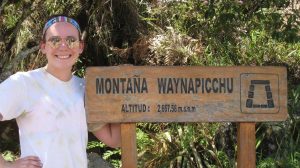 After she graduates from UMF in 2018, Brittany plans on moving back home to Massachusetts and going to grad school to get her Master’s degree in Applied Behavioral Analysis. “I want to work with young children with severe behavior problems,” said Brittany. “After my first practicum experience, I realized how important it is for children to receive intervention for behavior-related issues early on, in order to prevent suspension or even expulsion before they reach first grade. They usually just need assistance communicating their needs, they shouldn’t be labeled as a ‘bad kid.'”
After she graduates from UMF in 2018, Brittany plans on moving back home to Massachusetts and going to grad school to get her Master’s degree in Applied Behavioral Analysis. “I want to work with young children with severe behavior problems,” said Brittany. “After my first practicum experience, I realized how important it is for children to receive intervention for behavior-related issues early on, in order to prevent suspension or even expulsion before they reach first grade. They usually just need assistance communicating their needs, they shouldn’t be labeled as a ‘bad kid.'”
Along with being our ED360 editor, Brittany also works as a Behavioral Health Professional (BHP) for Maine Behavioral Health Organization. As a BHP, Brittany provides one-on-one support to teens and adolescents with developmental delays and mental health diagnoses. “It’s a very rewarding job, and it has taught me a lot about patience, empathy, and working with families,” she said. The job definitely keeps her busy!
While on campus, Brittany tries to be as involved as she can! She is a member of Alpha Phi Omega, a co-ed fraternity that focuses on community service and organizes and participates in various service projects on 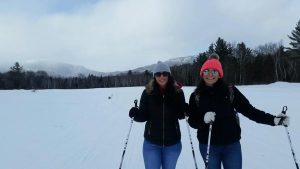 campus and in the community. Brittany has served as treasurer, Membership Vice President, and President of APO during her past three years in the club, and she is looking forward to taking a break from e-board for the next year and just being an active member. Brittany and her friends also participate in some of the Mainely Outdoors day trips, including snowshoeing and cross country skiing.
campus and in the community. Brittany has served as treasurer, Membership Vice President, and President of APO during her past three years in the club, and she is looking forward to taking a break from e-board for the next year and just being an active member. Brittany and her friends also participate in some of the Mainely Outdoors day trips, including snowshoeing and cross country skiing.
Brittany has also participated in various trips offered at UMF. In 2016, Brittany traveled to New Orleans, Louisiana with the Intervarsity Club during spring break to aid in Hurricane relief and volunteer fixing up damaged houses. Brittany also recently returned from the travel course to Peru, where she spent two and a half weeks studying anthropology all over the country with peers. Brittany loves traveling and exploring new places!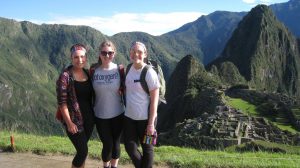
This summer, Brittany has been working, spending time outside, and exploring all that Farmington has to offer in the summertime. If you see her around town or on campus feel free to say hello! Be sure to stay up to date with the ED360 blog posts to learn more about UMF, our students and faculty, and the various opportunities offered in the Farmington community!
Graduate Studies in Education at UMF
The University of Maine at Farmington understands the importance of furthering and continuing education. That is why UMF offers various graduate degrees and certification programs beyond the first four years. UMF offers two Master of Science in Education programs and five certificates, including other additional programs. With all of these options, future educators have great opportunities to continue their professional development.
Master of Science in Education:
M.S.Ed. in Early Childhood Education- This program prepares educators to also be advocates, leaders, curriculum specialists, program administrators, and resources for young children and their families. The program emphasizes curriculum, child development, assessment, and the family and community dynamic. Through collaboration with community agencies, students are able to get a hands-on approach to building their skills. Students are mentored by faculty with extensive knowledge and abilities in the education field.
Approximately 30% of the program is delivered face-to-face, while the remaining 70% is conducted online. This 36-credit program is designed to be completed in 6 years and is comprised of both core and elective classes, which will be related to the early childhood field.
M.S.Ed. in Educational Leadership- This program contributes to the professional, intellectual, and personal growth of educators who wish to serve as exceptional leaders in their schools and communities. The program emphasizes school improvement and action research. Students in the program will complete an acton research project during the final two courses. This project focuses on classroom practice and/or school improvement. It includes planning, intervention, data collection, analysis, and the producing a professional report by presenting to faculty and peers.
This program is also 30% face-to-face and 70% online. The program is designed to be completed in two to three years. The Master of Science in Education program is approved as part of the New England Association of Schools and Colleges (NEASC) accreditation of the University of Maine at Farmington.
Certificate Programs:
Certification Programs are four-course programs comprised to graduate study courses to provide participants with a comprehensive, strong knowledge and skill base in a defined area of study.
Certificate of Administration- Designed for educators with two years experience teaching (required for admission), this program provides participants with the skills and knowledge to pursue opportunities in school administration.
Certificate in Applied Behavioral Analysis- This program prepares educators and professionals to work with challenging and difficult behaviors. Applied Behavioral Analysis is one of the best evidence-based practices for working with children on the Autism spectrum. If you are interested in this program enroll now- it will not be offered again until the Fall 2019!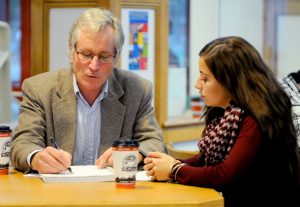
Certificate in Gifted and Talented Education- This program prepares educators to work with exceptionally gifted and talented children. All courses are offered in a blended format, combining both face-to-face and online deliveries.
Certificate in Math Leadership- This program is designed for currently practicing educators to pursue opportunities in mathematics leadership. This program opens doors to various career options, including Math Coach, RTI Coordinator, Title 1: Math Teacher, and more!
Certificate in Proficiency Based Education- This program is designed for educators who wish to grow their content knowledge and increase their pedagogy. Participants will increase their skills in curriculum design, instruction, assessment, organization, and communication in order to best teach their students.
Other Programs:
Maine Mathematics Coaching Project (MMCP)- In July of 2015 UMF began piloting the Maine Mathematics Coaching Project. MMCP is designed to support PreK-8 teachers in transitioning to the role of mathematics coach in an elementary school setting. The three goals of the program are to (1) prepare Maine students to meet career and college mathematics demands, (2) provide teachers in the state of Maine with high quality mathematics professional development, and (3) increase interest, engagement, and self-efficacy in mathematics for students and teachers.
Special Education Alternative Route to Certification (SPARC)- This online program helps to address the need for qualified special educators in the state of Maine. This program is open to all current Special Education educators holding a baccalaureate degree, including in-service educators, those working in Birth to Age 5 intervention settings, Ed Techs, and others. Upon program completion, participants will receive their 282 certification in Special Education in the state of Maine.
With a growing demand for qualified, knowledgable, experienced, and competent educators, there are many opportunities for educators to further their education. UMF programs are flexible and designed to meet the demands of a constantly changing field. For more information about UMF graduate and certification programs, visit the UMF Graduate Studies website.

